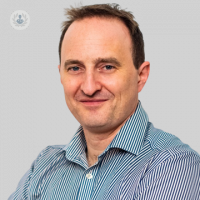Wisdom teeth removal: an expert's guide
Written in association with:Wisdom teeth can be extremely painful, especially if they are impacted. The removal of these teeth is one of the most common surgical procedures in the UK. In his latest article, renowned consultant oral and maxillofacial surgeon Mr Ross Elledge explains this procedure in detail.

When is it necessary to consider the removal of wisdom teeth?
Wisdom teeth can require removal for various causes. One of the most common causes is recurrent infections around the wisdom teeth, called pericoronitis. This is an infection that requires multiple courses of antibiotics. Other less common causes include cysts or tumours, if the teeth are in the line of intended surgery for other reasons, or if they are decayed or damaged.
How are impacted wisdom teeth removed?
Impacted wisdom teeth are usually taken out with a surgical approach. We have to raise a flap of gum around the tooth to uncover it. We then usually divide the tooth into pieces and remove different sections of the tooth because essentially, it's like taking a large object out of a small hole. At the same time, we're taking great efforts to protect the teeth nearby and the adjacent structures.
What are the different options for treatment?
The first treatment option is to do nothing and leave the wisdom tooth in. Some people choose to do this if they've had recurrent infections that may be settling, they might choose to just have it monitored.

Another option is something called an operculectomy. This is when the soft tissue covering the tooth is removed so that it's easier to keep clean. However, this is rarely done.
A coronectomy is another option, which involves the removal of the crown of the wisdom tooth, and leaves the roots behind. This reduces the risk of nerve injuries to one of the adjacent nerves.
Finally, the wisdom tooth can also be completely removed.
Are there any risks involved? How can these risks be minimised?
As with any surgery, there is the risk of some pain, swelling and discomfort afterwards. This should get better within a few days to a couple of weeks.
The biggest risk with wisdom teeth surgery is that there are two nerves nearby. One is responsible for supplying feeling to your tongue and also taste, and the other one supplies feeling to your lower lip, chin and your lower teeth. There is a risk of temporary or permanent alteration and sensation to both of these nerves. This can include numbness and something called neuropathic pain, which can be uncomfortable.
Fortunately, this only happens in a minority of cases, and it is mostly temporary.
It can be permanent in around 1 in 250 patients. An X-ray can show if the nerve is close to the wisdom teeth. To reduce the risk of damage to that nerve, I usually do a three-dimensional scan of the teeth. We can then discuss the option of a coronectomy, or I can be extra careful with my surgery and know where the nerve is at the time of removing the wisdom tooth.

Is it painful?
Wisdom teeth can be removed while the patient is asleep or awake. If they are removed while awake, the patient receives injections at the start to numb the area. Thanks to these injections it shouldn't be painful, but you can have a sensation of pressure.
There might be some funny noises, but I tell the patient what I'm doing throughout the procedure, so that they feel comfortable and understand what's happening.
If you have the teeth removed while you sleep, obviously you're unaware of the whole thing. I also use a long-acting local anaesthetic at the end of the procedure, so that you’ll be numb when you wake up.
How many wisdom teeth can be removed in a single session?
If the patient is asleep, I can take out all four wisdom teeth at once if that's what's required.
If the patient is awake, I usually remove both teeth from just one side of the mouth (an upper and lower tooth) in a single sitting. If I were to do both lower teeth, I would need to numb the entire lower lip and chin and that can be really uncomfortable and cause some problems. We usually do one side and then six weeks later do the other side.

What is the recovery period like and what can a patient do to alleviate pain?
This is very variable. Some people's wisdom teeth are very easy to remove, and they'll feel better within 48 hours. Some people's wisdom teeth are really hard to remove, and they also need to have some bone removed. As the procedure is more complicated, these patients can take 1 – 2 weeks to recover.
What I usually tell people is to try and avoid smoking as much as possible, if not entirely.
Regular, over-the-counter pain relief, like paracetamol and ibuprofen also help. If they were particularly tricky wisdom teeth, then I'll usually prescribe some codeine for the first few days. Patients can use a bit of warm water with table salt as a mouth rinse, or an antiseptic mouthwash.
Some people will develop something called a dry socket, where the socket takes a little bit longer to heal and have to return back for dressings. This is more common in smokers and tends to be relatively infrequent.
Antibiotics are typically prescribed only if the procedure was quite tricky, and there was evidence of active infection at the time.
Mr Ross Elledge is a renowned consultant oral and maxillofacial surgeon based in Birmingham and London, with over 20 years of experience. If you would like to book a consultation with Mr Elledge, you can do so today via his Top Doctors profile.


